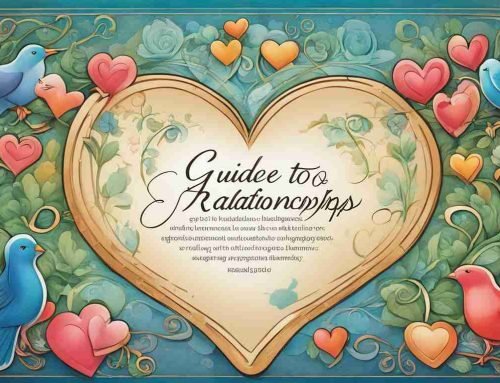Communication is the foundation of any successful relationship. It is the glue that holds two people together, enabling them to build a strong emotional connection. Effective communication skills are crucial in building and maintaining healthy relationships. If you are struggling with communication in your relationship, don’t worry, you are not alone. Many couples face this challenge, but the good news is that there are several ways to improve your communication skills.
Improving communication skills takes time, effort, and commitment. It requires a willingness to listen, understand, and be understood. In this article, we will explore the foundations of communication, practical strategies for building stronger relationships, and techniques for overcoming communication barriers. By the end of this article, you will be equipped with the tools and knowledge to enhance your communication skills and take your relationship to the next level.
Key Takeaways
- Effective communication is essential in building and maintaining healthy relationships.
- Improving communication skills requires time, effort, and commitment.
- This article will explore the foundations of communication, practical strategies for building stronger relationships, and techniques for overcoming communication barriers.
Understanding the Foundations of Communication
Open communication is the foundation of any healthy relationship. When we communicate openly, we create an environment of trust, where both partners feel heard and valued. Trust is built over time through consistent communication, and it is essential to the development of any long-lasting connection. Respect for each other’s feelings and opinions ensures that both partners feel safe expressing themselves without fear of judgment or criticism.
Empathy is another critical component of effective communication. When we empathize with our partner, we put ourselves in their shoes and try to understand their perspective. By doing so, we become more sensitive to their needs and are better equipped to respond to them. Empathy helps us to avoid misunderstandings and conflicts, promoting healthy communication and a deeper connection with our partners.
Healthy relationships require effort and commitment. Open communication, trust, respect, and empathy are the pillars of a strong and long-lasting connection. By prioritizing these foundations, we can create a positive and fulfilling relationship that stands the test of time.
Communication Strategies for Building Stronger Relationships
Effective communication is crucial in building and maintaining strong relationships. To improve your communication skills and foster deeper connections, consider applying the following communication strategies:
Active Listening
Active listening is the foundation of effective communication. It involves focusing on what the other person is saying and trying to understand their perspective. When engaging in a conversation, make a conscious effort to listen attentively without interrupting or jumping to conclusions. Show that you’re listening by nodding, maintaining eye contact, and rephrasing what the other person has said to confirm your understanding. By doing so, you show respect and empathy, which creates a safe space for open communication.
Clear and Assertive Communication
Clear and assertive communication is essential in conveying your thoughts and feelings effectively. It involves expressing yourself confidently and honestly while being considerate of the other person’s feelings. When communicating assertively, avoid using language that might be perceived as aggressive or accusatory. Use “I” statements instead of “you” statements, and focus on your own feelings and experiences. Be specific about what you want to communicate, and avoid generalizations or assumptions.
Non-Verbal Cues
Non-verbal cues, such as tone of voice, facial expressions, and body language, can convey powerful messages in communication. Pay attention to your own non-verbal cues and try to interpret those of the other person. Use a friendly and inviting tone of voice, maintain eye contact, and keep an open posture. This will help to create a positive and safe atmosphere for communication.
Resolving Conflict
Conflict is inevitable in any relationship, but it doesn’t have to be detrimental. To resolve conflicts effectively, communicate your concerns calmly and assertively. Listen actively to the other person’s perspective and try to understand their point of view. Avoid attacking or blaming the other person and focus on finding a mutually beneficial solution.
By applying these communication strategies, you can build stronger relationships and cultivate deeper connections with the important people in your life.
Enhancing Communication Through Emotional Intelligence
Effective communication involves more than just exchanging words. Emotions play a significant role in the way we communicate and understand others. Emotional intelligence is the ability to identify and manage your own emotions and those of others around you. By developing emotional intelligence, you can enhance your communication skills and build stronger relationships.
So, what are some communication techniques that involve emotional intelligence?
- Practice active listening: When engaging in a conversation, focus your attention on the speaker. Give them your undivided attention and listen with an open mind. Avoid interrupting or making assumptions. By actively listening, you show that you value and respect the other person’s thoughts and feelings.
- Use clear and assertive communication: Be clear and concise when expressing your thoughts and feelings. Be assertive but avoid being aggressive or confrontational. Use “I” statements to express how you feel instead of blaming the other person.
- Pay attention to non-verbal cues: Body language, facial expressions, and tone of voice can convey a lot about a person’s emotions. Pay attention to these cues and respond accordingly. For example, if your partner looks upset, you could ask if they want to talk about it.
- Understand and manage your own emotions: Being aware of your own emotions can help you communicate more effectively. Take time to reflect on how you feel and why you feel that way. If you’re feeling angry or upset, take a break and calm down before continuing the conversation.
- Show empathy: Put yourself in the other person’s shoes. Try to understand their perspective and show that you care about their feelings. Ask questions to clarify their thoughts and feelings and express your understanding.
By applying these communication techniques, you can improve your emotional intelligence and build stronger, more fulfilling relationships.
Overcoming Communication Barriers
Effective communication can be challenging, especially when communication barriers arise. These barriers can hinder the development of healthy and strong relationships. However, there are strategies that can help overcome these barriers and improve communication skills.
Defensiveness
One of the most common communication barriers is defensiveness. This arises when an individual feels attacked or criticized, leading to a defensive response. Defensiveness can often escalate conflicts and hamper effective communication.
To overcome defensiveness, active listening can be employed. This involves listening to the other person’s perspective and acknowledging their feelings without judgment. It’s important to communicate in a non-threatening manner and avoid attacking or placing blame on the other person.
Criticism
Criticism can also be a significant barrier to effective communication. When individuals are criticized, they may feel attacked or devalued. This can make them defensive and less receptive to communication.
One way to overcome criticism is to provide constructive feedback. This involves expressing concerns or frustrations in a compassionate and respectful manner. It’s important to focus on the behavior or action rather than the person. This can create an environment where both parties feel heard and valued.
Poor Listening Skills
Poor listening skills can also hinder effective communication. When individuals aren’t fully engaged in the conversation, they may miss important information or misunderstand the other person’s perspective.
Active listening is critical in overcoming poor listening skills. This involves giving full attention to the other person, asking questions, and summarizing key points. By doing so, the conversation can become more productive and communication barriers can be overcome.
Despite the challenges that communication barriers present, effective communication is possible. By employing active listening, providing constructive feedback, and improving listening skills, individuals can overcome communication barriers and build stronger relationships.
The Power of Non-Verbal Communication
Communication is not just about the words we speak. Non-verbal cues such as body language, facial expressions, and tone of voice can convey powerful messages. In fact, research suggests that up to 93% of communication is non-verbal.
Improving non-verbal communication skills can enhance the effectiveness of communication in relationships. Here are some techniques to consider:
- Pay attention to body language: Be mindful of your own body language and pay attention to your partner’s. Avoid crossing your arms, slouching, or fidgeting, as these can communicate defensiveness or disinterest. Instead, maintain an open posture and make eye contact to convey attentiveness and engagement.
- Use facial expressions: Smiling, nodding, and making appropriate facial expressions can demonstrate interest and understanding. However, be mindful of not overdoing it, as that can come off as insincere.
- Pay attention to tone: The tone of voice can convey a wide range of emotions, from enthusiasm to frustration. It’s important to use an appropriate tone that matches the message. Speak calmly and clearly to convey confidence and avoid misunderstandings.
Improving non-verbal communication skills can help build deeper connections and promote greater understanding in relationships. Remember, non-verbal communication can be just as powerful as verbal communication in conveying messages, so it’s important to use it effectively.
Communication Exercises for Couples
Improving communication in relationships takes effort and practice. Practicing communication exercises together can help couples build stronger connections and improve their overall communication skills. Here are some exercises to try:
- Active Listening: Set aside dedicated time to listen to each other without interruption. Repeat back what you heard to ensure understanding.
- Non-Verbal Communication Check-In: Take turns observing and commenting on each other’s non-verbal cues, such as body language and tone of voice.
- Role Play: Act out a common communication scenario, such as a conflict or disagreement, and practice expressing your thoughts and feelings in a constructive manner.
- Expressing Gratitude: Take turns expressing gratitude for each other and specific things in your relationship that you appreciate.
- Reflective Listening: Share a personal experience and have your partner reflect back what they hear without judgment or advice.
Regularly engaging in these exercises can help couples develop stronger communication habits and foster deeper intimacy in their relationships.
Seeking Professional Help for Communication Challenges
Despite our best efforts, there may come a time when communication challenges in relationships seem insurmountable. In such instances, seeking professional help can be a game-changer.
Relationship advice from a couples therapist or counselor can provide a safe and supportive environment for addressing deep-seated issues. Professional intervention can also provide unbiased guidance for improving overall communication skills. Skilled professionals can help couples develop active listening and empathy skills, learn to communicate clearly and assertively, and resolve conflicts in healthy ways.
It’s important to remember that seeking professional help is not a sign of failure, but rather a proactive step towards building a stronger and happier relationship. Therapists and counselors can help identify underlying issues and provide tailored guidance for addressing them, helping couples break down communication barriers and nurture effective communication skills that can last a lifetime.
Nurturing Effective Communication in Long-Distance Relationships
Effective communication is vital for any relationship, but it becomes even more important in long-distance relationships. The distance and lack of physical presence can make it challenging to maintain strong emotional connections, but with the right communication strategies, it is possible to keep the bond alive.
To nurture effective communication in long-distance relationships, it is important to establish clear expectations and guidelines for communication. This includes setting a regular schedule for phone or video calls, as well as deciding on the preferred mode of communication, whether it be phone calls, texts, emails or any other medium.
Another helpful strategy for improving communication in long-distance relationships is utilizing technology to create a sense of closeness. Sharing photos and videos, sending surprise gifts, and playing online games together are just a few ways to stay connected and strengthen the bond.
Effective communication also requires actively listening to your partner and showing empathy towards their feelings. Being present in the moment and focusing on the conversation at hand can help to create deeper emotional connections, even from afar.
Finally, it is important to be open and honest about any challenges or concerns in the relationship. Having difficult conversations can be uncomfortable, but it is essential for growth and strengthening the relationship.
By implementing these strategies, couples in long-distance relationships can maintain effective communication and build a stronger emotional connection, despite the physical distance.
Communication and Intimacy: The Connection
In relationships, communication and intimacy are closely intertwined. When communication is open and honest, it can strengthen emotional connections and foster deeper intimacy. Effective communication skills are essential for healthy and happy relationships.
It can be challenging to talk about sensitive topics, share emotions, or express vulnerabilities with a partner. However, avoiding communication can lead to misunderstandings, conflicts, and disconnection. To nurture intimacy, partners must be willing to communicate authentically, actively listen, and show empathy.
Improving communication skills can enhance the quality of a relationship and increase overall satisfaction. It requires a willingness to learn, practice, and be patient. Being able to express oneself in a manner that is respectful and assertive, while also being open to feedback, is critical to maintaining a deep and loving connection.
Creating a safe space for communication to occur takes time and effort. Couples can cultivate intimacy by regularly checking in with one another, expressing gratitude, and creating opportunities for shared activities. By prioritizing effective communication, partners can build deeper emotional bonds and a stronger connection that will stand the test of time.
Cultivating Lasting Communication Habits
Improving communication skills in relationships is a journey that requires continuous effort and growth. To cultivate lasting communication habits, it is essential to establish healthy communication patterns and maintain consistency in relationships. Here are some practical tips to enhance effective communication and deepen your connections with your loved ones:
Practice Active Listening
Active listening is an important aspect of effective communication. It involves paying attention to what your partner is saying and responding appropriately. To practice active listening, eliminate distractions, maintain eye contact, and avoid interrupting. Repeat what you have heard to ensure you understand your partner’s message correctly.
Be Clear and Assertive
Clarity and assertiveness are crucial in communication. Express your thoughts and feelings clearly and assertively, without being aggressive or passive. Be direct and honest to avoid misunderstandings or confusion. Use “I” statements instead of “you” statements to avoid sounding accusatory.
Use Non-Verbal Cues
Non-verbal cues such as body language, facial expressions, and tone of voice can convey messages effectively. Use them to enhance your message and show empathy towards your partner. Avoid negative non-verbal cues such as crossing your arms or rolling your eyes, as they can cause misunderstandings or hurt feelings.
Resolve Conflicts Effectively
Conflicts are a part of any relationship, but it is essential to resolve them effectively. Listen actively, avoid blaming, and focus on finding a solution together. Use “I” statements to express how the conflict is making you feel instead of attacking your partner’s character. Be willing to compromise and reach a mutually beneficial solution.
Continuous Growth and Learning
Communication skills can be improved with continuous growth and learning. Attend workshops or seminars together to learn new strategies and techniques. Read books or articles on communication to deepen your understanding. Be open to feedback from your partner and willing to work on areas that need improvement.
By incorporating these tips into your daily communication, you can build lasting communication habits that will strengthen your relationships. Remember, effective communication is essential for a healthy and happy relationship.
Conclusion
Effective communication is the foundation of any healthy and long-lasting relationship. Whether it’s with a romantic partner, family member, or friend, mastering communication skills can make all the difference. By understanding the foundations of communication and utilizing practical strategies, anyone can improve their communication and build stronger connections.
Emotional intelligence plays a crucial role in effective communication, enabling individuals to manage their emotions and communicate more effectively. Meanwhile, identifying and overcoming common communication barriers can help prevent misunderstandings and conflicts.
Remember that non-verbal communication can be just as important as what is said, and regularly practicing communication exercises can help couples become more connected and attuned to each other.
For those struggling with communication challenges, seeking professional help through couples therapy or counseling can provide a safe and supportive space to work through deeper issues and improve communication skills.
Lastly, cultivating lasting communication habits is the key to maintaining healthy relationships. By consistently applying the tips and strategies shared in this article, individuals can establish healthy communication patterns and continue to grow and learn together.
Take the First Step
Don’t wait until communication becomes a major issue in your relationship. Take the first step today by implementing some of the tips and strategies shared in this article. Remember that effective communication is a lifelong journey, so don’t be afraid to continue learning and growing together.
FAQ
Q: What is the importance of effective communication in relationships?
A: Effective communication is crucial in relationships as it allows partners to understand each other better, resolve conflicts, and foster deeper emotional connections. It helps build trust, respect, and empathy, leading to healthier and more fulfilling relationships.
Q: What are the foundations of communication in relationships?
A: The foundations of communication in relationships include open and honest communication, trust, respect, and empathy. These elements create a safe and supportive environment for effective communication to thrive, leading to healthier and more meaningful connections.
Q: What are some strategies for improving communication in relationships?
A: Some strategies for improving communication in relationships include active listening, clear and assertive communication, and paying attention to non-verbal cues. It is also important to practice empathy, patience, and understanding when engaging in conversations with your partner.
Q: How does emotional intelligence enhance communication?
A: Emotional intelligence plays a vital role in communication by allowing individuals to understand and manage their own emotions, as well as the emotions of their partner. It helps create a more empathetic and compassionate communication style, leading to deeper connections and better understanding in relationships.
Q: What are common communication barriers in relationships?
A: Common communication barriers in relationships include defensiveness, criticism, poor listening skills, and failure to express emotions effectively. These barriers can hinder effective communication and lead to misunderstandings and conflicts.
Q: How can non-verbal communication improve relationships?
A: Non-verbal communication, such as body language, facial expressions, and tone of voice, can convey messages that words alone may not express. By paying attention to and improving non-verbal cues, individuals can enhance their ability to understand and connect with their partner on a deeper level.
Q: What are some communication exercises for couples?
A: Communication exercises for couples include activities aimed at improving listening skills, expressing emotions, and fostering deeper understanding. These exercises can help partners develop stronger communication skills and create a more open and supportive environment in their relationship.
Q: When should couples consider seeking professional help for communication challenges?
A: Couples should consider seeking professional help for communication challenges when they are unable to resolve deep-seated issues on their own or when their communication difficulties significantly impact their relationship. Couples therapy or counseling can provide guidance and tools to improve communication and resolve underlying issues.
Q: How can effective communication be nurtured in long-distance relationships?
A: Maintaining effective communication in long-distance relationships requires utilizing technology, setting communication expectations, and creating a sense of closeness despite the physical distance. Regular and open communication can help bridge the gap and foster a strong and connected relationship.
Q: How does communication impact intimacy in relationships?
A: Communication plays a vital role in fostering intimacy in relationships. Open and honest communication allows partners to express their needs, desires, and vulnerabilities, leading to a deeper emotional connection and a more fulfilling intimate life.
Q: How can lasting communication habits be cultivated?
A: Lasting communication habits can be cultivated by establishing healthy communication patterns, maintaining consistency, and continuously learning and growing in communication skills. It is important to prioritize effective communication as an ongoing practice for a successful and lasting relationship.





